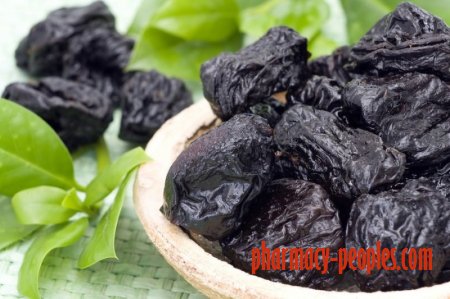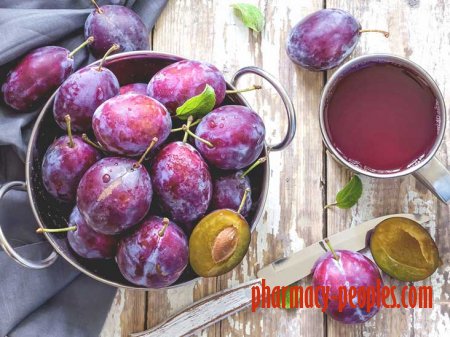Benefits of Prune Juice: A Powerful Constipation Reliever
You may have heard about prune juice for babies or older adults, but this purple-colored drink is breaking old stereotypes and gaining a whole new following. Don’t be mistaken, the health benefits of prune juice still include constipation relief, but that is not all it can offer. Made from prunes (also known as dried plums), prune juice is packed full of beneficial nutrients, antioxidants, and phytochemicals that can support your health from head to toe.
If you are looking for natural ways to support healthy digestion, bone growth, colon function, heart health, and more, then you need to give prune juice a chance. Below, we will explore all the health benefits of prune juice, who should drink it, and how to make your own organic prune juice at home.
What Are Prunes?
Prunes are dried plums. Today’s prune farmers carefully select different plum varieties based on their unique potential for being dried and juiced. In the United States, there are only a handful of plum varieties that make their way into mass-produced prune juices, the most popular being Prunus domestica, sometimes called the European plum.
In my opinion, prunes should be flying off the shelves. However, they have experienced a popularity crisis over the years as many assume prunes are only for the very young or very old. Sometime around 2001, prune producers started to rebrand their prunes as “dried plums.” While they are the same thing, when selecting the best prune juice you should stick to the ones labeled “prune.” Making this choice helps ensure the distinct color, flavor, and nutrition that prune juice offers. Select certified organic options whenever available.
How Is Prune Juice Made?
Once the plums are harvested and dried, the juicing process begins. First, the prunes are placed in boiling water and soaked until the juice starts to release and the fruit starts to disintegrate. Next, the mixture is separated and filtered. What remains is a delicious juice that is high in dietary fiber and other health-promoting compounds.
What Vitamins & Minerals Are Found in Prune Juice?
There are lots of naturally occurring nutrients found in prune juice. Every glass contains an ample blend of vitamins, minerals, and polyphenols that have helped support wellness for centuries. Prunes also contain some lesser-known trace minerals like iodine and boron and provide significant amounts of the nerve-boosting mineral, potassium.
The Top 7 Health Benefits of Prune Juice
While some health benefits of prune juice are well-known, others may surprise you. Here are the top seven health benefits of drinking prune juice.
1. Constipation Relief
Yes, prune juice can help you poop—it’s no joke! Prune juice has naturally occurring insoluble and soluble fiber as well as a natural compound called sorbitol. Together, these compounds can help reduce the occurrence and the effects of constipation.
Prunes and prune juice are among the best natural ways to add fiber to your diet. Fiber is critical for those looking to put a stop to constipation. Insoluble fiber in prune juice helps add bulk and weight to your stool, helping it move through your digestive system more quickly.
Sorbitol is found in prunes and many other healthy fruits, including apples, cherries, and peaches. It is a naturally occurring sugar alcohol, which acts as a sweetener in prune juice. Sorbitol is also an effective laxative. It works by pulling in water to soften the stool, making going to the bathroom much easier for most people.
2. Supports Strong Bones
Bone density and strength is a growing concern among older Americans. Often, someone won’t even know there is an issue until a break or significant bone loss occurs. Luckily, there are some fruits and vegetables anyone can add to their diet to help support their nutrition and normal bone health.
Healthy bones are always in a steady cycle of deterioration and regrowth. However, people with high free radical counts may experience bone loss at a rate that outpaces new growth. This imbalance can lead to painful fractures and breaks. Antioxidant consumption through fruits and vegetables, like prunes, may help keep free radicals in check and encourage healthy bone growth and strength.
Prunes are also a rich source of vitamins and minerals that are known to support healthy bones, including boron, calcium, magnesium, and vitamin K.
3. Promotes Colon Health
Thousands of Americans die each year due to complications with their colon. As science looks for preventative solutions, some studies have turned to prunes as a possible answer. While more research is needed, one of these studies did demonstrate that prune juice encouraged healthy growth and function of colon cells, which may help support long-term colon health.
4. Boosts Gut Health
So many health concerns stem from an unhealthy gut. Your best bet for long-term health should focus on promoting proper gut health with the right balance of probiotics. If this is your goal, then prunes can help. Healthy guts rely on a collection of good bacteria that form the gut flora, otherwise known as your microbiota. To thrive, the healthy bacteria in your gut must receive nutrients known as prebiotics. The fiber found in prune juice provides prebiotics and can help contribute to a happy, balanced gut.
5. Helps Maintain Normal Heart Health
Prune juice has the potential to help your body maintain a healthy heart in several different ways. Prunes can have a positive effect on cholesterol levels, blood pressure, and even plaque buildup.
One study followed participants who consumed prunes every day for a year. Total cholesterol levels were lowered by up to 8% at the end of the experiment. Another study conducted over a much shorter period still showed lowering effects for those with high cholesterol. Participants consumed 12 prunes a day for the eight-week study and significantly lowered their LDL cholesterol—otherwise known as bad cholesterol.
Like cholesterol, blood pressure is a concern for those looking to maintain optimal heart health. Prunes have a long history of use for blood pressure in countries like India and Pakistan, and modern research is confirming some of these potential benefits. Several animal studies have shown that prune extracts contributed to lower blood pressure in mice.
Prunes may also help prevent some common heart concerns such as plaque buildup on arterial walls, and promote long-term heart health through their abundance of antioxidants, potassium, and vitamin K.
6. May Support Weight Management
Anyone who has ever tried a new diet knows that snacks play a vital role in the success or failure of your weight loss goals. Some research has shown that prunes may be a good choice for some dieters because they can lower total energy intake. In other words, prunes can help you eat less.
Blood sugar can also be a concern for those looking to manage their weight or who have complications with diabetes. Some studies suggest that eating prunes will not immediately increase your glucose level, while others have used prunes as a way to lower blood sugar levels. More conclusive research is needed to determine exactly how prunes affect blood sugar, but substances in prunes like sorbitol are used in some diabetic-friendly candy as a sugar alternative.
7. Encourages Normal Liver Function
Prunes contain nutrients that may help promote normal liver function. One clinical trial studied the effects of prunes on 166 healthy participants. Each person was given prune juice or whole, dried prunes daily over an eight-week period. Blood samples were taken at the beginning and the end of the study. Researchers concluded prunes may promote a healthy liver and could prevent some liver-related health concerns.
Who Should Drink Prune juice?
Daily consumption of prune juice really could benefit almost anyone. However, those that are more prone to constipation, such as pregnant women, may especially benefit from a daily serving of prune juice. Prune juice has a mild laxative effect and complete lack of serious side effects that have solidified it among the most popular home remedies for children with constipation as well.
Ways to Add Prune Juice to Your Diet
There are a lot of different ways you can start consuming more prune juice. Drinking one to two cups a day should be enough to feel a difference. Many people find it convenient to drink it with their breakfast each morning.
If you don’t care for the juice, then eating the whole, dried prune can be a great alternative. Some parents even like mixing in prunes with nuts and other healthy snacks to make a healthier version of trail mix.
How to Make Organic Prune Juice at Home
If you can’t find organic prune juice at your local supermarket, or you just want an option without any preservatives or additives, then making prune juice at home is a healthy alternative. All you need is some time and two ingredients—prunes and water.
Ingredients
- 1 cup organic prunes
- 5 cups distilled or filtered water
Directions
1. Make sure all of the pits have been removed from the prunes.
2. Place the 5 cups of distilled or filtered water into a non-toxic saucepan.
3. Turn heat to high and bring water to a rolling boil.
4. While the water is heating, place your cup of pitted prunes in a non-toxic, heat-proof glass container.
5. Once the water has been at a rolling boil for 2 to 5 minutes, carefully pour the water into your glass jar until the prunes are covered completely.
This should be about 1 cup of hot water.
6. Place the extra water aside for later, and leave the prunes to soak for 24 hours.
7. After the prunes are properly soaked, blend the prunes and water mixture using a blender or immersion blender. Blend until there is a smooth consistency.
8. Use a sieve or cheesecloth to filter out any large chunks from the blended mixture.
9. Combine the remaining water that you set aside earlier with the blended prunes.
10. Stir until combined, and then chill the juice in the fridge.
11. If your prune juice is not sweet enough, then there are some organic sweetener options. Try adding some organic pear juice, honey, or some monk fruit to taste for a subtle sweet flavor.
Prune Juice Side Effects & Precautions
Prune juice has no serious recorded side effects. However, some people do have a plum and prune allergy. Parents should be cautious and follow their pediatrician’s advice before giving dried prunes or prune juice to their children. Because prune juice has a mild laxative effect, overconsumption may cause unwanted gas or mild diarrhea. Drinking only one to two cups of prune juice a day should avoid any of these complications in healthy adults. While prune juice is not as acidic as other fruit juices, it does have a low level of acids that may trigger acid reflux for sensitive individuals.






